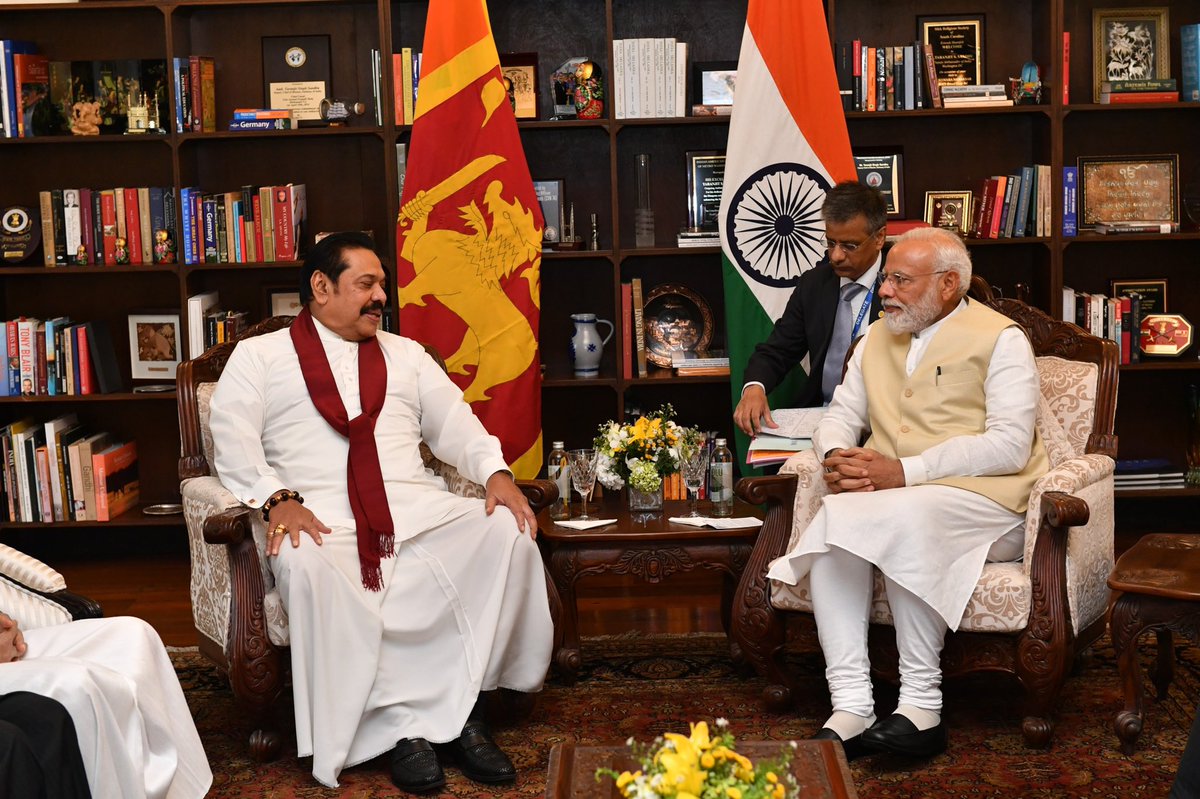
Reporting for the Hindu, Austin Fernando, former Sri Lankan High Commissioner to India, notes that despite a relative dip in the amount of aid offered by India to Sri Lanka; the current administration is “patching up with the Rajapaksas”.
This assessment follows a tenuous and troubled relationship between the two countries. In February of this year, Indian Prime Minister, called upon the Sri Lankan government to “carry forward the process of reconciliation” and to implement the Thirteen Amendment, which relates to devolving power to provincial councils across the island.
However, despite any commitments on this, during Sri Lankan President Gotabaya Rajapaksa’s visit to New Delhi, Modi announced a $450 million line of credit to Sri Lanka. This for Fernando illustrates India’s “proactive, relations-building” approach”.
“Comparatively speaking, ours has been great as friends, neighbours, and relations,” he commented.
India’s relationship with Sri Lanka
Senior journalist, V. Thanabalasingham, has stated with respects to Tamil rights in Sri Lanka;
“The Tamil leaders may feel helpless and appeal to India but realistically, India is unlikely to take any strong positions on the Tamil question now. With its growing geopolitical concerns in the region, India wouldn’t want to lose what remains of its influence in Sri Lanka by raising the Tamil issue”.
![]()
Earlier this month the families of the disappeared in Vavuniya called on the Indian Prime Minister, Narendra Modi to help Tamils on the island and to immediately intervene and protect Hindu temples.
Read more here: Families of the disappeared urge Indian PM to help protect Hindu temples
India has frequently trained many Sri Lankan officers, which have been accused of war crimes, in anti-terrorism techniques. Both Sri Lanka and India are accused of regressive counter-terrorism measures such as Sri Lanka’s Prevention of Terrorism Act and the Indian Public Security Act which enables authorities to detain subjects without a trial. The PTA has been linked to cases of enforced disappearances, sexual violence, and torture. Several Sri Lankan regimes have been criticised for the failure to repeal the PTA, despite widespread criticism from human rights defenders and international NGOs.
India’s support to Sri Lanka
Following the economic collapse caused by the coronavirus, India’s has engaged in discussions with Sri Lanka on debt relief, for a debt of $960 million, as well as a currency swap under bilateral and SAARC arrangements.
The Reserve Bank of India has extended a $400 million USD currency swap with the Central Bank of Sri Lanka, which will remain available to the country till November 2022. This announcement was made following discussions between India’s Deputy High Commissioner Vinod K. Jacob and Governor of Sri Lanka’s Central Bank. Sri Lanka has also submitted another requested another billion US dollar swap from India, reports Economy Next.
According to Economy Next, private credit in Sri Lanka has since slowed down and the country has imposed import control on an economy. They further report that over the past three weeks the central bank had also withdrawn some of the excess liquidity that triggered instability.
Anti-Indian sentiment
With respects to Sri Lanka’s economic development, the Hindu points to opposition to the East Container Terminal (ECT) project at the Colombo Port as an illustration that administration was succumbing to Sinhala nationalist groups or xenophobic forces “within the establishment”.
The ECT project was jointly agreed upon by Sri Lanka, India and Japan in 2019 however in early July, Prime Minister Rajapaksa claimed that there was no final decision on the project. This statement followed strong opposition from rival political parties and unions which asserted that Sri Lanka was “giving away national assets” to India. This was even though Sri Lanka’s Port Authority was to retain 100% ownership of the facility, as per the 2019 tripartite Memorandum of Cooperation. This comes in advance of the parliamentary elections on 5th August.
Thanabalasingham further notes on this matter that:
“The opposition to these projects, you may notice, are always greater when India or the US is involved. They don’t see China as a ‘foreign power’ quite the same way, despite knowing Sri Lanka’s dependence on China for infrastructure support or for our economy.”
Read more about Sri Lanka’ relationship to china here: Chinese Investment and the BRI in Sri Lanka – Chatham House
Read more from Economy Next and The Hindu
We need your support
Sri Lanka is one of the most dangerous places in the world to be a journalist. Tamil journalists are particularly at threat, with at least 41 media workers known to have been killed by the Sri Lankan state or its paramilitaries during and after the armed conflict.
Despite the risks, our team on the ground remain committed to providing detailed and accurate reporting of developments in the Tamil homeland, across the island and around the world, as well as providing expert analysis and insight from the Tamil point of view
We need your support in keeping our journalism going. Support our work today.
For more ways to donate visit https://donate.tamilguardian.com.

